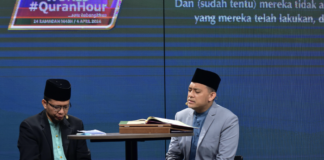PUTRAJAYA, Oct 22 — The Health Ministry’s (MOH) biggest challenge in containing the COVID-19 infection in Sabah was the frontliners having to go through thick jungles to conduct contact tracing, Health director-general Tan Sri Dr Noor Hisham Abdullah said.
In sharing the new challenge, he said this was due to the lack of education, awareness and understanding about the disease among the community in Sabah’s inland areas compared to the peninsula.
“They (patients who had symptoms) wanted to run away when they saw the frontliners coming….there was a big (thick) forest in Kampung Air, for example, (and) they tried to escape.
“When we wanted to admit them, we had to force them to go to the hospital,” he said.
Therefore, Dr Noor Hisham said it was important for the MOH staff to work closely with the police and army to bring those diagnosed positive to the hospital and to contain the infection.
On a separate development, Dr Noor Hisham said the MOH would carry out follow-up checks on discharged COVID-19 patients every three months to see whether there were any side effects and complications involved.
“We need to monitor if there is any long-term side effects or complications, especially for patients in stage four and five of the disease (COVID-19),” he said.
Meanwhile, he said patients who had recovered from COVID-19 could form a support group where the MOH would provide guidance.
“It is good if they can come together and share their experience, for example, in terms of how to overcome the challenges and also what have been done to them,” he said.
On the spread of the viral infection in the prisons, Dr Noor Hisham said the MOH was now studying the procedures in handling the prisoners including the problem of congestion in the prisons.
He said this was because the infection could spread (among the prisoners) if some of them who were taken out to the courts for case mention or hearing, had to spend the night at another place like the police headquarters and so on.
“When they return to their prison, not only them but their security escorts could also have been infected. That is why, among the causes for the virus to spread in the prisons and detention centres is congestion and secondly, could be through the prison staff or visitors but we are not certain about this.
“So, we are now studying the existing procedures at the prisons, immigration detention depots and lock-ups towards improving these procedures,” he added.
Asked on today’s decision by the Attorney-General’s Chambers (AGC) not to charge Plantation Industries and Commodities Minister Datuk Dr Mohd Khairuddin Aman Razali with home quarantine breach due to insufficient evidence, Dr Noor Hisham said his previous statement on Aug 25 “still stands”.
On Aug 25 during the COVID-19 press conference, Dr Noor Hisham said the top officials of the ministry were not informed about the minister’s violation of the home quarantine rules.
Prior to that, an internal investigation was conducted and on Aug 24, MOH received the report of the internal investigation.
Dr Noor Hisham highlighted that the case was under police investigation as it was also part of the enforcement of the Prevention and Control of Infectious Diseases (Measures within the Infected Local Areas) Regulations 2020 and Prevention and Control of Infectious Diseases Act 1998 (Act 342).
Dr Noor Hisham said Section 3 of Act 342, whereby public officers, police, the AG….were also bound by the Act and therefore the case would be left to the police to investigate and take the necessary action.
















